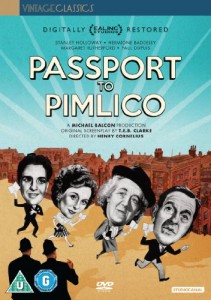The Scottish Independence debate causes me to revisit a favourite old film.

Ah, digital downloads, bedrock of the “I want it now generation.” Gone are the days when, reminded of an old favourite, I have to wait for it to appear on TV, rummage through the bomb-site of my rainy-day VHS collection or venture out in the rain to the high street or my local rental shop (ah, remember those?). Now I can impulse buy in a second and impulse watch in a few seconds more.
Well, I can if what I want is actually on iTunes of course (rare!). And if my neighbours aren’t hogging the local bandwidth with Strictly Come Dancing (rarer!). Otherwise I’m kinda screwed.
This Saturday’s impulse buy came in the form of the 1949 British classic from the venerable Ealing Studios, Passport to Pimlico.
The motivation for it? This weekend’s Scottish independence debate on Radio 4‘s Any Questions.
Passport to Pimlico
Unlike most of my favourite Ealing comedies this one unusually doesn’t feature the malleable Alec Guinness in at least one role. This time it’s the redoubtable Stanley Holloway in the lead, ably supported by an array of names-yet-to-be (perhaps most noticeably a young Charles Hawtrey).
 Oh, and of course, Margaret Rutherford.
Oh, and of course, Margaret Rutherford.
It’s post-war London; rationing is still in force and times are hard. The good burghers of Pimlico are awaiting the detonation of a wartime bomb. When it happens they’re joyous to discover a horde of buried treasure and surprised also to find a charter that makes Pimlico technically part of Burgundy and no longer part of Britain. They’re even more joyous when they realise their early break into the European Union frees them from such British impedimenta as those ration books (not to mention the alcohol licensing laws).
Joy soon turns to pain as a horde of crooks and ruffians descend on Pimlico to take advantage of its tax and law free status too. The British Government (dare I say, the evil “Westminster Elite”?), through a combination of diplomacy and dithering, escalate the standoff to the point where the “poor Burgundians” are starved of the security, water, food and electricity they’d all rather taken for granted.
As with all Ealing’s finest this story has a happy ending, with the people of Pimlico cheerily re-united with the rest of the UK and still managing to keep their treasure.
Hmmm.
Passport to Partick?
It’s not the notion of Scottish independence that sent my mind spiralling back to this gentle comedy classic from my childhood. Rather, it’s the Scottish independence campaign that brought it to mind.
The much mentioned televised debates between Alex Salmond, titular head of the secessionists and wannabe first Sultan of an independent Scotland, and Alastair Darling, a former British government minister leading the Unionist campaign, were widely considered a one-all draw by the popular media. Darling got the upper hand in the first while Salmond bounced back in the second.
And I think I see why.
In that Any Questions debate a pro-independence panellist remarked that not one of the nations that has achieved independence in the last hundred years would want to go back. Whilst many of those cases aren’t direct parallels this seems a fair, historical point. But the birth and early life of those independent nations was far from an easy journey and hardships were endured for several years while they found their feet. It seems self-evident that the early days of an independent Scotland would see such hardships; some UK businesses will be forced to keep themselves and at least some jobs in the UK, some workers’ tax revenues and company tax revenues will drain out of Scotland’s economy, new trade alliances will need to be forged around the world and confidence won around the world. Yet the independence campaign seem to suggest those warning of this are being negative, dismissive, or even worse plain lying from being in the sway of that sinister “Westminster Elite”.
And then there’s the open-sore and done-to-death subject of the currency. When the Baltic states achieved independence from Russia did they fight to keep the Rouble? It was arguably their Rouble as much as Russia’s after all. No, they wanted their own currency and recent economic history has plenty of good examples to show why they were wise so to do. The Euro, which has no fiscal union underpinning it (though it has a limited proxy via block grants), has painful stories to cover both extremes. Ireland overheated in the early noughties whilst Greece chronically underperformed and both, many years after the credit crunch, are still some way from being back on their feet. Compare them to tiny Iceland which suffered a short, sharp shock but seems to be recovering rather better. Amazing what your own central bank, monetary policy and currency can do isn’t it?
That same Any Questions panellist protested that Ireland was “allowed to keep the pound” on independence. Again this is a fair historical fact but in this instance far more historical than fair. The world’s economy has changed a bit in the nigh hundred years since the Irish Free State left the United Kingdom and even then they only held on to Sterling for a few short years. Our understanding of world economics has moved on a fair bit in that time too. Yet once more it seems the independence campaign, a campaign who’s titular head is a trained economist mark you, just accuse anyone suggesting they can’t or shouldn’t keep Sterling – even such independent professionals as the head of the Bank of England – as politicking, posturing or again in the sway of that oh-so-sinister Westminster Elite.
Passport to prosperity
An independent Scotland can surely work and can surely flourish. Smaller nations with less going for them have pulled it off after all, Scotland doubtless can.
In fact, Scotland is perhaps at a unique point in its history to be able pull it off as painlessly as possible. Like the good burghers of Pimlico after all it has treasure under the ground, treasure that won’t last forever but treasure which nonetheless can bankroll it through those tricky early days whilst it finds its feet.
I’m an Englishman born and bred, but an Englishman with more ties to Scotland than many. I’ve worked in Scotland for about half of the last ten years and I keep my boat up there. It’s a great country with great people and I would seriously consider moving there permanently. As a man self-employed for most of my career the notion of going it alone and doing better for oneself is deeply entrenched in my nature too. Yet, if I were a Scot I’d be voting no in this referendum. That’s not because I have the slightest problem with the notion of Scottish independence, but because I can drive busses through the holes in what the Scottish independence campaign seem to be putting out.
Tragically, it seems to me, holes that simply don’t need to be there.
Which begs the question, why are they there?
Passport to politics
Whichever way the vote goes two things will stick with me long after this process is consigned to the history books. The first is how bloody long it’s taken – South Sudan managed to pull off an independence referendum in well under two and a half years so why the hell couldn’t we? The second is just how badly politics can contaminate, derail and destroy what should be a sober and informed debate. Both sides are equally guilty of this but I feel the independence campaign are the ones with the most to lose from it.
Take the jobs issue. What’s wrong with being frank with people that there will be challenges in the early years but we’ve got a once in our history opportunity to bankroll our way through, that some jobs may be lost but that they’ll be replaced, replaced with new jobs for a new Scotland, a better Scotland, blah, blah, blah?
You get my point I hope. You can present the truth in a positive way and people will feel respected for hearing it, empowered for knowing it and trust you for saying it. Instead the naysayers are tiresomely accused of lying, posturing, and being blackmailed by the Bond-villain Westminster Elite. Not to mention being threatened with a Godfather-esque Day of Reckoning when the revolution comes.
Perhaps the SNP will pull it off in spite of themselves. But if they don’t it won’t be the independence cause that will have failed but the independence campaign that will have failed it.